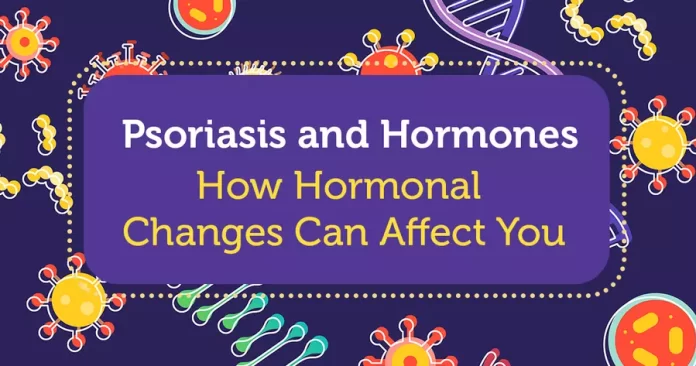Estimated reading time: 0 minutes
Psoriasis, a pervasive skin condition, affects millions globally and involves more than just the visible symptoms of red, scaly patches. It is intricately linked to the body’s hormonal balance, with fluctuations potentially exacerbating or alleviating symptoms. This article delves into how hormones impact psoriasis, shedding light on the underlying biological interactions and offering strategies to manage these influences effectively.
Comprehensive Overview of Psoriasis
Psoriasis is an autoimmune disease characterized by rapid skin cell proliferation, leading to thick, inflamed, and scaly patches. It arises from an immune dysfunction where the body erroneously targets healthy skin cells, causing significant inflammation. The triggers of psoriasis include genetic factors intertwined with environmental influences, among which hormonal fluctuations play a crucial role.
The Role of Hormones in Psoriasis
Hormones, the body’s chemical messengers, regulate numerous functions including growth, metabolism, and immune responses. Their levels directly influence inflammation and skin health, making them central to understanding and managing psoriasis.
Cortisol Dynamics
Known as the “stress hormone,” cortisol is produced by the adrenal glands and is vital in managing stress, metabolism, and inflammatory responses. Elevated cortisol levels can suppress immune activity and temporarily reduce inflammation, often masking psoriasis symptoms temporarily. Conversely, a decrease in cortisol can lead to heightened inflammation and exacerbate psoriasis symptoms. Effective management of cortisol through stress reduction and lifestyle choices is essential for mitigating psoriasis flare-ups.
Estrogen and Progesterone
Fluctuations in the levels of estrogen and progesterone, the primary female hormones, have noticeable effects on psoriasis. Estrogen tends to suppress inflammatory responses, which is why some women may experience an improvement in psoriasis symptoms during pregnancy when estrogen levels are high. Conversely, the postpartum period or menopause, both characterized by a drop in estrogen levels, can trigger psoriasis flare-ups. Hormone replacement therapy (HRT) during menopause may also affect psoriasis, though its impact can vary greatly among individuals.
Testosterone
Testosterone generally exerts an anti-inflammatory effect on the body. Men with psoriasis often have lower testosterone levels compared to those without the condition, and lower testosterone levels are associated with more severe psoriasis symptoms. Addressing testosterone imbalances may, therefore, provide therapeutic benefits for managing psoriasis.
Thyroid Hormones
Thyroid hormones, which are critical for metabolic regulation, also affect skin health. Imbalances in thyroid function, such as in hyperthyroidism or hypothyroidism, have been linked to psoriasis flare-ups. These hormonal imbalances can alter skin hydration and integrity, thereby influencing the severity of psoriasis.
Strategies for Managing Hormonal Triggers in Psoriasis
Managing the hormonal aspects of psoriasis involves a multifaceted approach that includes lifestyle interventions, medical monitoring, and dietary considerations.
Stress Management
Effective stress management is crucial due to its significant impact on cortisol levels and subsequent inflammatory responses. Techniques such as meditation, yoga, and regular physical exercise can help maintain hormonal balance and manage psoriasis symptoms.
Monitoring and Managing Hormonal Health
Regular medical consultations to monitor hormone levels can be crucial for individuals with psoriasis. Managing thyroid disorders, adjusting hormone replacement therapies, and evaluating the effects of hormonal medications are critical components of comprehensive psoriasis care.
Nutritional Support
Adopting a diet that supports hormonal balance and reduces inflammation can aid in managing psoriasis. Foods rich in omega-3 fatty acids, antioxidants, and fiber help regulate inflammation and support overall hormonal health. Limiting alcohol consumption and avoiding smoking are also advisable, as these habits can disrupt hormonal balance and aggravate psoriasis symptoms.
Medication Review
For patients undergoing hormonal treatments such as contraceptives or hormone replacement therapy, regular reviews with healthcare providers are necessary. This ensures that the benefits to skin health are maximized without exacerbating psoriasis.
Conclusion
The intricate relationship between hormones and psoriasis underscores the importance of a holistic approach to treatment that considers not just external symptoms but also internal physiological processes. By understanding and managing hormonal influences, individuals with psoriasis can achieve better control of their symptoms and significantly improve their quality of life. Further research into hormonal pathways promises to enhance therapeutic strategies, offering hope for more targeted and effective interventions for those affected by this complex condition.
Related-
Know More About Ayurveda Treatment For Psoriasis
GET IN TOUCH


Recent comments